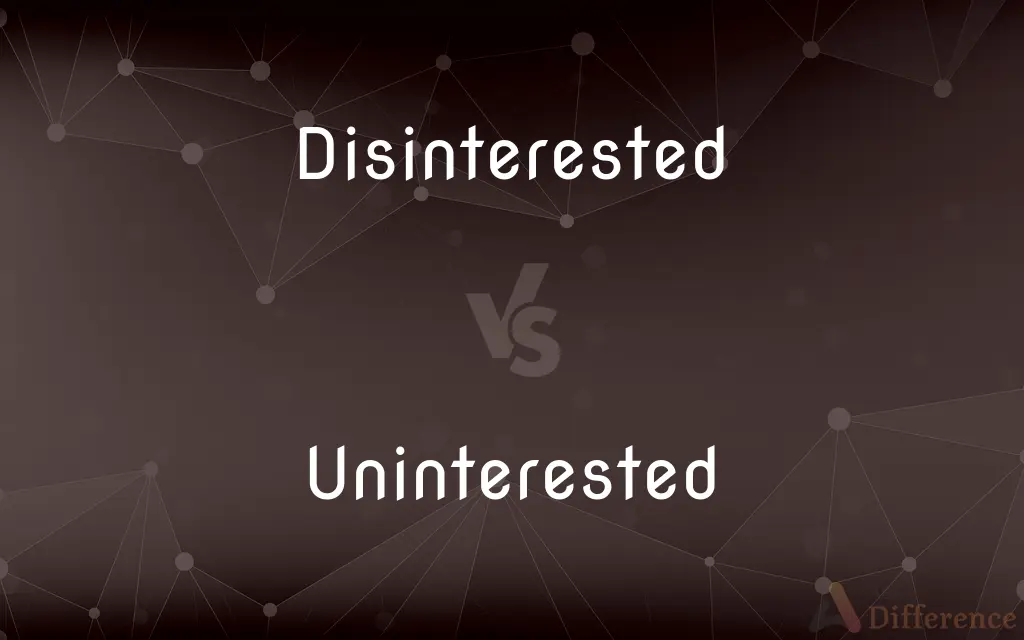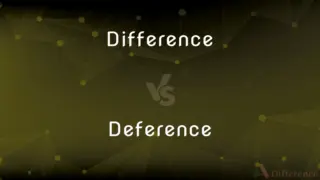Disinterested vs. Uninterested — What's the Difference?
Edited by Tayyaba Rehman — By Fiza Rafique — Updated on November 1, 2023
Disinterested means impartial; uninterested means not interested. One serves fairness; the other lacks curiosity or concern.

Difference Between Disinterested and Uninterested
Table of Contents
ADVERTISEMENT
Key Differences
Disinterested implies a lack of bias or vested interest in the outcome. It conveys impartiality. For instance, a judge should be disinterested, having no personal stake in the case's result.
Uninterested suggests a lack of interest or concern about something. It denotes apathy or indifference. A person might be uninterested in politics, meaning they find the subject boring or of no concern.
It's crucial to maintain the distinction between disinterested and uninterested for clear communication. Using "disinterested" when you mean "uninterested" can cause confusion, as the former relates to fairness, not boredom or lack of engagement.
Being disinterested is often a positive attribute, indicating a capacity for objective judgment. In contrast, being uninterested can be perceived negatively, suggesting disengagement or lack of enthusiasm.
The misuse of disinterested when one means uninterested has become common. However, in formal writing and speech, maintaining their distinct meanings is recommended to avoid ambiguity and preserve precision.
ADVERTISEMENT
Comparison Chart
Definition
Having no bias or personal interest
Having no interest or concern
Implication
Fairness, impartiality
Boredom, indifference
Connotation
Often positive, as in objectivity
Often negative, as in apathy
Use in Sentence
Reflects a lack of stake in the outcome
Reflects a lack of curiosity or desire to engage
Professional Context
Ideal for judges, referees, mediators
Can imply negligence or inadequate engagement
Compare with Definitions
Disinterested
Impartial or unbiased.
As a disinterested observer, she noted the proceedings without involvement.
Uninterested
Showing no curiosity.
He glanced at the brochure but remained uninterested.
Disinterested
Having no stake in an outcome.
Her disinterested analysis provided a clear view of the facts.
Uninterested
Not engaged by a subject.
Uninterested in sports, she never watched the games.
Disinterested
Judicial in detachment.
He remained disinterested during the debate, not favoring either side.
Uninterested
Apathetic toward an activity.
The students were uninterested in homework.
Disinterested
Not influenced by considerations of personal advantage
A banker is under an obligation to give disinterested advice
Uninterested
Not interested; indifferent.
She was uninterested in the conversation.
Disinterested
Having or feeling no interest in something; uninterested
Her father was so disinterested in her progress that he only visited the school once
Uninterested
Lacking enthusiasm.
Their uninterested response dampened the mood.
Disinterested
Free of bias and self-interest; impartial
"disinterested scientific opinion on fluorides in the water supply" (Ellen R. Shell).
Uninterested
Not interested in or concerned about something or someone
An uninterested voice
I was totally uninterested in boys
Disinterested
Not interested; indifferent
"supremely disinterested in all efforts to find a peaceful solution" (C.L. Sulzberger).
Uninterested
Not interested in something; having no interest.
Disinterested
Having lost interest.
Uninterested
(obsolete) Unmotivated by personal interest; unbiased, disinterested.
Disinterested
Having no stake or interest in the outcome, and no conflicts of interest; free of bias, impartial.
Uninterested
Not interested; indifferent, not concerned.
I was uninterested in the TV program, so I read a book instead.
Disinterested
(proscribed) Uninterested, lacking interest.
Uninterested
Not interested; not having any interest or property in; having nothing at stake; as, to be uninterested in any business.
Disinterested
Not influenced by regard to personal interest or advantage; free from selfish motive; having no relation of interest or feeling; not biased or prejudiced; as, a disinterested decision or judge.
The happiness of disinterested sacrifices.
Uninterested
Not having the mind or the passions engaged; as, uninterested in a discourse or narration.
Disinterested
Unaffected by self-interest
Uninterested
Not having or showing interest;
An uninterested spectator
Disinterested
Free from self-interest.
The disinterested party mediated the dispute effectively.
Uninterested
Having no care or interest in knowing;
She appeared totally uninterested
Disinterested
Not influenced by considerations of personal advantage.
A disinterested decision is expected from the jury.
Common Curiosities
What does uninterested mean?
Uninterested means not interested or indifferent.
Can disinterested and uninterested be used interchangeably?
No, they have different meanings and should not be used interchangeably.
Is being uninterested always negative?
Not necessarily, but it often carries a negative connotation of indifference.
Is a disinterested viewpoint valuable in decision-making?
Yes, a disinterested viewpoint can help ensure fair and unbiased decisions.
What does disinterested mean?
Disinterested means impartial or without self-interest.
Can a person be both disinterested and uninterested?
Yes, one can be impartial (disinterested) and not personally engaged (uninterested) in something.
Can an uninterested person make a good judge?
Likely not, as their lack of interest could affect their engagement and judgment quality.
Should a mediator be disinterested or uninterested?
A mediator should be disinterested (impartial), not uninterested (indifferent).
Do dictionaries list disinterested and uninterested as synonyms?
Some may, due to common usage, but traditionally they are not synonyms.
Why is it important to distinguish between disinterested and uninterested?
To avoid confusion; disinterested relates to impartiality, uninterested to lack of interest.
Is disinterested a negative trait?
No, disinterested is often a positive trait, indicating objectivity.
In legal contexts, which is more appropriate: disinterested or uninterested?
Disinterested is more appropriate, as it signifies impartiality.
How can I remember the difference between disinterested and uninterested?
Think of "disinterested" as "dis-invested" in personal gain, and "uninterested" as "not interested."
If someone is bored, are they disinterested or uninterested?
They are uninterested, as they lack interest or excitement about the topic or event.
Is it common for people to confuse disinterested and uninterested?
Yes, the confusion between the two is common.
Share Your Discovery

Previous Comparison
Difference vs. Deference
Next Comparison
Themself vs. ThemselvesAuthor Spotlight
Written by
Fiza RafiqueFiza Rafique is a skilled content writer at AskDifference.com, where she meticulously refines and enhances written pieces. Drawing from her vast editorial expertise, Fiza ensures clarity, accuracy, and precision in every article. Passionate about language, she continually seeks to elevate the quality of content for readers worldwide.
Edited by
Tayyaba RehmanTayyaba Rehman is a distinguished writer, currently serving as a primary contributor to askdifference.com. As a researcher in semantics and etymology, Tayyaba's passion for the complexity of languages and their distinctions has found a perfect home on the platform. Tayyaba delves into the intricacies of language, distinguishing between commonly confused words and phrases, thereby providing clarity for readers worldwide.















































